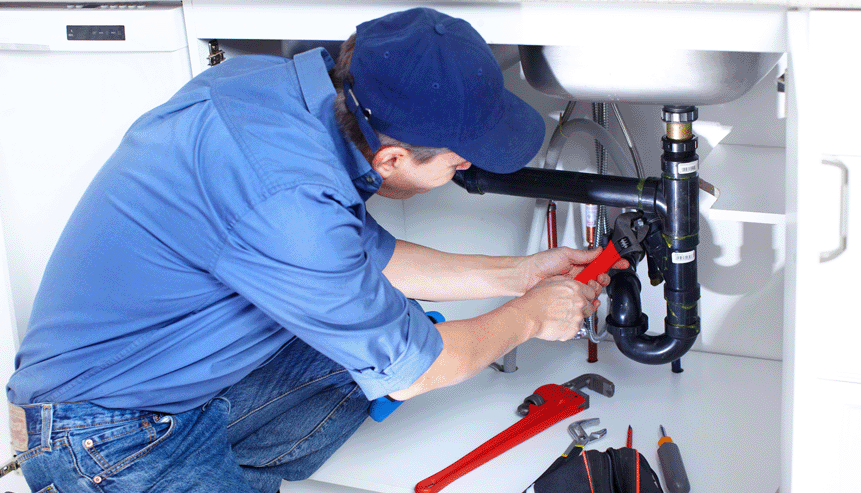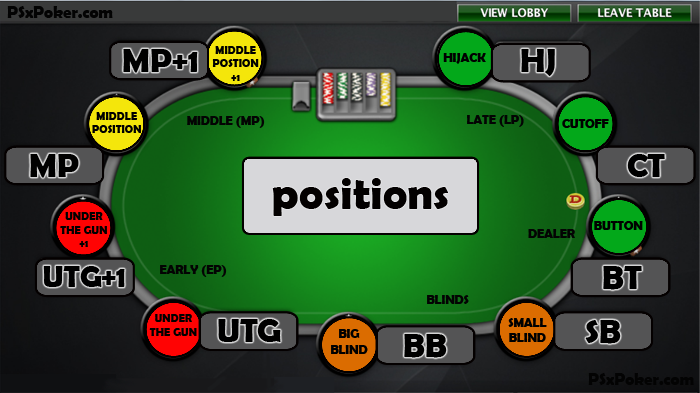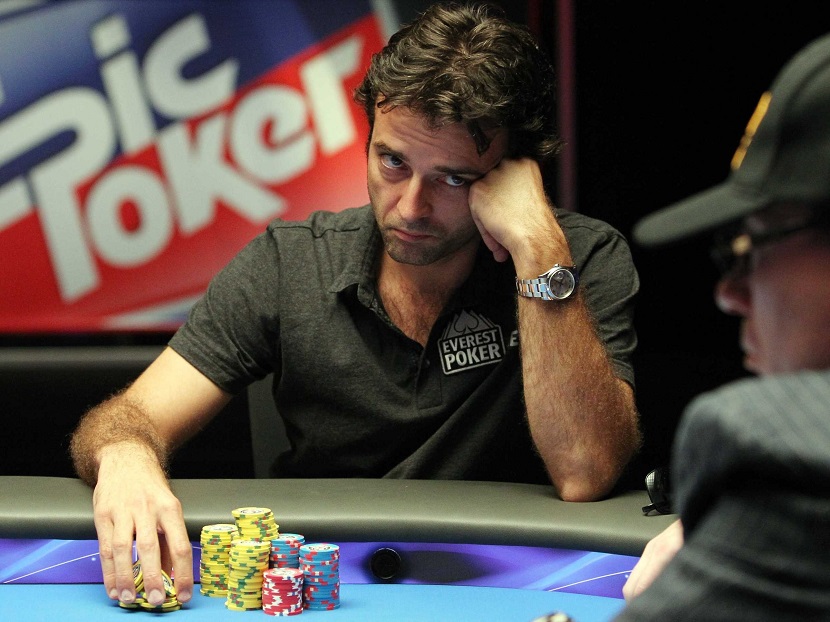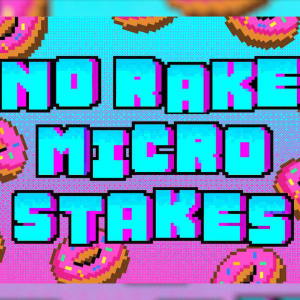
Poker is not a tough game to learn, but it is very difficult to master and you must master all aspects of poker in order to be successful. You never see a successful golfer who cannot drive the ball or putt, you never see a good tennis player who cannot serve, or a master chess player who cannot find a checkmate.
It is very important to find and plug the gaps in your poker game and in this article we are going to look at the most common leaks that stop poker players short. Hopefully, by identifying the leaks, you can get to work eliminating these problems from your game, greatly increasing the chances of you having success at the poker tables.
No Positional Awareness
Position is everything in poker. If this is a new concept you have some research to do! There should be a big difference in your aggression depending on your position at the table. It takes some learning as “standard” play is based on hands, not position, but a good player knows their position has a massive impact on how to play a hand, not just their actual hole cards.

When we first play poker we play every hand. We lose, so we we quickly learn that AA, KK, QQ, AK are the best hands and that we like high pocket pairs too. We begin to fold everything else, however, our progression of learning eventually leads us to consider flop texture and opponents tendencies and we realize we can play some of the other hands because we have the distinct advantage of being able to see what our opponent does before we have to act ourselves.
Unfortunately, some players do not progress to the end of this process and forget that playing gapped hands and suited connectors is fine provided you have position and that different hands are playable (and unplayable) depending on your position.
Too Predictable
We go to extreme lengths to appear unpredictable, but if we are not careful that can lead to us being very predictable.
We have all been in a spot where you see a player literally groaning, contorting, and moaning before flipping over quads. Usually, by this time, it is no surprise as it is really obvious. We have also seen spots where a player begs for a call then mucks their hand when they are called as the hero reveals nothing more than middle pair. They acted strong so looked weak.

You can tell a story about your hand over a number of streets. For example, check calling then check raising can look like you hold a hand other than the nuts and if you combine this move with a tasty turn card you can confuse your opponent.
Overplaying Hands and Pair Poker
Even if you are a superb poker player, you will be able to recall a time when this type of scenario happened in your mind. You are dealt AA, KK, or QQ and you inwardly fist pumped and thought to yourself “this is it, time to get some chips.” Then the flop came down connected and in a single suit and you think “damn, bad flop, but I’m still winning some chips, this is my moment.” Your opponent bets or raises on the turn. “Damn, damn! But I might still be winning.” You call. Onto the river. A decent if unspectacular card hits and you bet. Your opponent raises. You think “Ok this is bad, I’m really not feeling good now. In fact, I feel awful. But I might win, I have great hole cards.” So you call. You lose the hand and feel really bad about your play.

Do not become a pair poker player. Learn to chase draws in the right spots, play suited connectors, and remember a pair is only a pair. Aces look great, but their value plummets like the pound after Brexit as you progress through a hand and your pesky opponent is still hanging around.
Keep your head and concentrate on your range versus your opponent's likely range. Forget about the two hole cards and start thinking about the value of the best five card hand you can currently make. As hard as it is to fold Aces, I think the moment you fold aces in a tough spot is a coming of age moment in poker. Even if it turns out to be a mistake, to fold the aces on this occasion at least you had the guts and the game to fold them.
Bad Continuation Betting
Modern poker rewards the tenacious. I remember many years ago when lots of hands played out “raise 3x the big blind preflop and get one caller. They check to you on the flop, you bet half the pot and, they fold.” You still see this nowadays, but it is less common. Opponents will note that if you make a continuation bet (c-bet) every time you are checked to after the flop, you cannot possibly have it every time. The float really spoils the fun of my “c-bet and collect” technique!
Single barrell c-betting and bluffing is exploitable and can be a leak too. If you notice opponents repeatedly c-betting then folding to a bet on the turn keep this in mind. If you leak chips this way look for alternatives. If you miss on the flop, try checking back then betting the turn instead. It changes the dynamic of the hand and plugs an exploitable leak. Just don’t do the same thing every time,; you have to keep your opponents guessing.

I Just Don’t Believe You
I have it. Or should I say, I’m telling you I have it. Do you believe me? Amateur players often fall foul of the fact that if you fold a hand you definitely lose it, whilst if you call at least you have a chance of catching your opponent on a bluff and winning the hand. While you might celebrate the odd amazing call, in practice, calling down every hand is a massive leak.
More often than not your opponents will be less sneaky than you might think. Watch poker closely on television and you will see far fewer absolute bluffs across multiple streets of betting than you might expect.
Calling because you disbelieve and having no other reason is a leak in your game and you need to plug it. If it’s barking like a dog it’s usually a dog. Poker can be extremely subtle and it is no co-incidence that Phil Hellmuth has 15 WSOP bracelets so far and is known for making big laydowns and shouting to his wife “they are trying to bust me honey!”.
Value Betting Errors
Value betting is making a bet to extract more chips from your opponent because you believe you have the best hand. If you fail to maximize your equity in the hand, you might win the hand but the reality is you lost money because you could have won more. Your better opponents will feel like the hand was a win for them because they could, and perhaps should, have lost more chips.
Many players fall into this trap and do not value bet enough on the river and it costs them valuable chips.
I can understand why you might be hesitant about making river bets. Bets on the river will be the largest bets in the hands, so you might feel there are already enough chips in the pot and you would be happy to scoop the pot as it stands. Unfortunately, this is a leak and a mistake. Sometimes checking is correct, but like I’ve said before, it’s not the action that’s the leak, it’s why you decided to do it! A check might be correct, but if you checked because you got scared that is really bad!

Not Managing Your Emotions
The Grandaddy of them all! You might have read this article and congratulated yourself that none of the leaks apply to you. This is good, but if you suffer a beat and go on tilt, getting angry and then making bad plays, you are just as likely to lose as a player who value bets incorrectly, overplays hands, or plays out of position too often.
Do whatever you can to brush off a bad beat. It is certainly frustrating when you are doing really well in a tournament and suffer a bad beat or an unlucky card which curtails your progress. You would be an emotional anomaly if this had no effect on you, but you must learn to manage your emotions and react as best you can to bad beats. You must be able to continue to play your best game.
As we have discussed above and in other articles, there is plenty of think about and plenty to do right. Losing your cool will increase the number of errors you make which will only serve to make you feel even worse and cost you money. Be honest with yourself at all times and plug the leaks where you find them.


